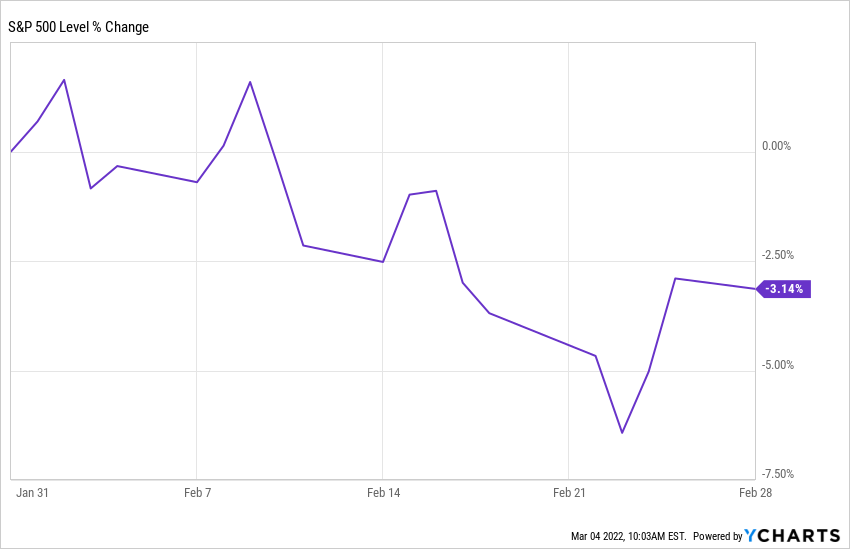Monthly Market Update
Submitted by TLWM Financial on March 3rd, 2022
February was a challenging month for stocks as the volatility that arrived in January continued with the S&P 500 finishing the month down 3.14%. Investors were focused on the potential impact of uncertainty in the markets; primarily, the Russia-Ukraine conflict, Federal Reserve policy, and inflation.
The recent invasion of Ukraine has led to a lot of questions about what investors should do right now. This invasion is clearly a major geo-political event and a humanitarian crisis for the people of Ukraine. Moving forward our job is to think about how this event may impact the economy and markets and position portfolios accordingly. With that in mind we’re going to review a few key things to consider:
- What is the impact to the economy? Historically, if a geo-political event does not lead to a recession, markets tend to recover and perform well over the next 12 months.
- Risks: One of the biggest economic risks is for an energy shock (a sharp jump in energy prices) as Russia is a big supplier of energy to Europe. This could exacerbate inflationary pressures and is something we’ll be monitoring.
- Outlook: Currently, we believe that the Ukrainian conflict is unlikely to lead to a recession in the US. Here are a few reasons why:
- The US economy remains strong, and our economic dashboard continues to suggest that a recession is unlikely. Recent economic data includes:
- US GDP Growth of 7% in Q4, 2021
- Strong corporate earnings (30% growth for S&P 500 in Q4, 2021)
- Strong consumer and retail data
- The US economy remains strong, and our economic dashboard continues to suggest that a recession is unlikely. Recent economic data includes:
Though headlines today are focused on Ukraine, perhaps the most notable event for markets in March is the Fed meeting on March 15-16th when the Fed is expected to begin raising rates.
While we navigate what may feel like a challenging environment our economic dashboard continues to guide us, and shows little chance of a recession in the near term. As such, we continue to have portfolios positioned for growth, but we’ll be keeping an eye out moving forward and will be ready to make changes as needed.
Sincerely,
Your Team at TLWM
* Investment advice offered through TLWM, LLC., a registered investment advisor.
* The Standard & Poor's 500 (S&P 500) is an unmanaged group of securities considered to be representative of the stock market in general. You cannot invest directly in this index.
* The Standard & Poor’s 500 (S&P 500) is an unmanaged index. Unmanaged index returns do not reflect fees, expenses, or sales charges. Index performance is not indicative of the performance of any investment.
* The 10-year Treasury Note represents debt owed by the United States Treasury to the public. Since the U.S. Government is seen as a risk-free borrower, investors use the 10-year Treasury Note as a benchmark for the long-term bond market.
* Government bonds and Treasury Bills are guaranteed by the U.S. government as to the timely payment of principal and interest and, if held to maturity, offer a fixed rate of return and fixed principal value. However, the value of fund shares is not guaranteed and will fluctuate.
* Corporate bonds are considered higher risk than government bonds but normally offer a higher yield and are subject to market, interest rate and credit risk as well as additional risks based on the quality of issuer coupon rate, price, yield, maturity, and redemption features.
* Credit risk can be a factor in situations where an investment’s performance relies on a borrower’s repayment of borrowed funds. With credit risk, an investor can experience a loss or unfavorable performance if a borrower does not repay the borrowed funds as expected or required. Investment holdings that involve forms of indebtedness (i.e. borrowed funds) are subject to credit risk.
* Typically, the values of fixed-income securities change inversely with prevailing interest rates. Therefore, a fundamental risk of fixed-income securities is interest rate risk, which is the risk that their value will generally decline as prevailing interest rates rise, which may cause your account value to likewise decrease, and vice versa. How specific fixed income securities may react to changes in interest rates will depend on the specific characteristics of each security. Fixed-income securities are also subject to credit risk, prepayment risk, valuation risk, and liquidity risk. Credit risk is the chance that a bond issuer will fail to pay interest and principal in a timely manner, or that negative perceptions of the issuer’s ability to make such payments will cause the price of a bond to decline.
* Opinions expressed are subject to change without notice and are not intended as investment advice or to predict future performance.
* Economic forecasts set forth may not develop as predicted and there can be no guarantee that strategies promoted will be successful.
* Past performance does not guarantee future results. Investing involves risk, including loss of principal.
* You cannot invest directly in an index.
* Consult your financial professional before making any investment decision.
* Stock investing involves risk including loss of principal.
* This document is solely for informational purposes. Advisory services are only offered to clients or prospective clients where Texas Legacy Wealth Management and its representatives are properly licensed or exempt from licensure.
* No strategy ensures a profit or protects against a loss.

